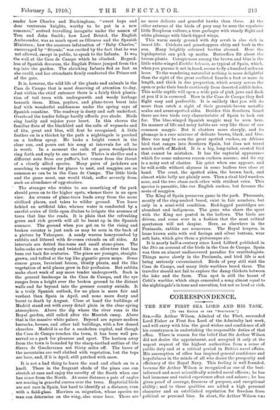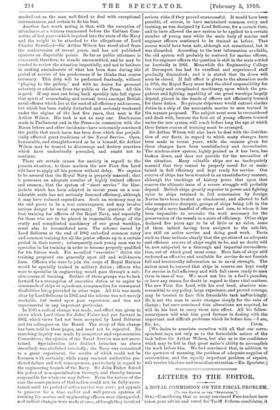CORRESPONDENCE.
THE NEW FIRST SEA LORD AND HIS TASK.
[TO THE EDITOR OF THE "SPECTATOR."]
Sin,—Sir Arthur Wilson, Admiral of the Fleet, succeeded Lord Fisher as First Sea Lord of the Admiralty last week, and will carry with him the good wishes and confidence of all his countrymen in undertaking the responsible duties of that office. There is reason for the belief that Sir Arthur Wilson did not desire the appointment, and accepted it only at the urgent request of the highest authorities from a sense of public duty and at a critical period in British naval affairs. His assumption of office has inspired general confidence and hopefulness in the minds of all who desire the prosperity and efficiency of the Royal Navy. This feeling is well founded, because Sir Arthur Wilson is recognised as one of the best- informed and most scientifically minded naval officers; he has had immense and varied experience afloat and ashore ; he has given proof of courage, firmness of purpose, and exceptional ability; and to these qualities are added a high personal character and an established reputation for freedom from political or personal bias. In short, Sir Arthur Wilson NI a3
marked out as the man well fitted to deal with exceptional circumstances, and certain to do his best.
Another fact worth noting is that, with the exception of attendance as a witness summoned before the Cabinet Com- mittee of last year—which inquired into the state of the Navy and the weight to be attached to the allegations of Lord Charles Beresford—Sir Arthur Wilson has stood aloof from the controversies of recent years, and has not published opinions on disputable points. So far as public utterance is • concerned, therefore, he stands uncommitted, and he may be trusted to review the situation impartially, and not to hesitate in making amendments of what has been done during the period of service of his predecessor if he thinks that course necessary. This duty will be performed fearlessly, without "playing to the gallery," and with no desire for personal notoriety or adulation from the public or the Press. All this is good. If any man can bring back speedily into full vigour that spirit of comradeship and mutual trust amongst British naval officers which lies at the root of all efficiency and success, but which has been rudely disturbed and seriously weakened under the regime of the last five years, that man is Sir Arthur Wilson. His task is not an easy one. Disclosures made in Parliament and in the Press—in connexion with the Bacon letters and other incidents—have necessarily convinced the public that much harm has been done which has prejudi- cially affected great traditions of the Naval Service. Open, honourable, and straightforward as he is himself, Sir Arthur Wilson may be trusted to discourage and destroy practices which have undoubtedly prevailed, and ought not to continue.
There are certain causes for anxiety in regard to the present situation; to these matters the new First Sea Lord will have to apply all his powers without delay. We require to be assured that the Royal Navy is properly manned; that it possesses an adequate number of highly trained officer's and seamen ; that the system of "short service" for blue- jackets which has been adopted in recent years on a con- siderable scale has not seriously lessened efficiency, although it may have reduced expenditure. Such an economy may in the end prove to be a real extravagance, and may involve serious danger to naval supremacy. The question of the best training for officers of the Royal Navy, and especially for those who are to be placed in responsible charge of the costly and complicated machinery of our great warships, must also be reconsidered soon. The scheme issued by Lord Selborne at the end of 1902 embodied common entry and common training for all the junior officers up to a certain • period in their career ; subsequently each young man was to specialise in his training in order to become properly qualified for his future work. For so-called "executive" duties the training proposed ran generally upon old and well-known lines. Officers who were to join the corps of Royal Marines would be specially trained in military duties ; officers who were to specialise in engineering would pass through a suit- able course of training. Neither of these groups was to look forward to a resumption of executive duties or to aspire to commands of ships or squadrons, compensation for consequent disabilities being provided in other ways. All this was made clear by Lord Selborne in 1902, and the scheme was not merely workable, but rested upon past experience, and was not experimental in any important particular.
hi 1C05 a radical change was made, and effect was given to views which Lord (then Sir John) Fisher had put forward in 1902, which views had not been accepted by Lord Selborne and his colleagues on the Board. The story of this change has been told in these pages, and need not be repeated. No searching inquiry was made by competent and representative Committees ; the opinion of the Naval Service was not ascer- tained. Specialisation into distinct branches (as above described) was abolished hurriedly ; the Navy was committed to a great experiment, the results of which could not be foreseen with certainty, while many eminent authorities pre- dicted failure and evil consequences, particularly in regard to the engineering branch of the Navy. Sir John Fisher forced his policy of non-specialisation through. and thereby became responsible for whatever may follow. From the nature of the case the consequences of that action could not be fully ascer- tained until his period of active service was over ; yet appeals to preserve for a time earlier and well-proven systems of training for marine and engineering officers were disregarded. sad radical changes were made at once, although they involved 'serious risks if they proved unsuccessful. It would have been possible, of course, to have maintained common entry and training, as was designed by Lord Selborne, for a certain time, and to have allowed the new system to be applied to a certain number of young men while the main body of marine and engineer officers continued to be trained as before. That course would have been safe, although not sensational, but it was discarded. According to the best information available, the old system will probably be restored for marine officers, but for engineer officers the question is still in the state settled on hurriedly in 1905. Meanwhile the Engineering College at Devonport has had its excellent and experienced staff gradually diminished; and it is stated that its doors will soon be closed. If full effect is given to the alteration made in 1905, the Royal Navy must find the chief responsibility for the costly and complicated machinery, upon which the pro- pulsion and fighting capability of our great warships largely depend, placed in the hands of officers not efficiently trained for these duties. No private shipowner would entrust similar duties in a ship of the mercantile marine to men trained in the manner proposed. The subject must soon be reconsidered and dealt with, because the first set of young officers trained under the new system will reach before long the age at which their future course of training must be arranged.
Sir Arthur Wilson will also have to deal with the distribu- tion of our fleets, in regard to which many changes have been made in recent years, while the reasons given for these changes have been unsatisfactory and inconclusive. The nucleus-crew system, highly praised as it has been, has broken down, and does not provide for the necessities of the situation. Many valuable ships are so inadequately manned that they cannot be properly cared for or main- tained in full efficiency and kept ready for service. Our reserve of ships has been treated in an unsatisfactory manner, although the teachings of history prove that upon that reserve the ultimate issue of a severe struggle will probably depend. British ships greatly superior in power and fighting value to ships retained in full commission by foreign Navies have been treated as obsolescent, and allowed to fall into comparative disrepair, groups of ships being left in the charge of a mere handful of officers and men, to whom it has been impossible to overtake the work necessary for the preservation of the vessels in a state of efficiency. Other ships declared five years ago to be of little or no value, some of them indeed having been assigned to the sale-list, are still on active service and doing good work. Facts such as these indicate clearly that the question of an adequate and efficient reserve of ships ought to be, and no doubt will be, now subjected to a thorough and impartial reconsidera- tion, out of which good must come. Mere lists of ships still reckoned as effective and available for service do not furnish full and trustworthy information as to naval strength. The nation must be assured that ships in reserve are kept ready for service in full efficiency and with full crews ready to man them in case of war. We must not live in a fool's paradise, or have any reason for doubt in regard to these vital matters. The new First Sea Lord, with his cool head, absolute non- committal to any policy, large experience, and proved courage, may be trusted to face this formidable task unflinchingly. He is not the man to make changes simply for the sake of change ; but once convinced that alterations are required, he will do his best to carry them into effect. All his fellow- countrymen will wish him good fortune in dealing with the important and difficult problems which lie before him.—I am, [We desire to associate ourselves with all that our corre- spondent says, not only as to the formidable nature of the task before Sir Arthur Wilson, but also as to the confidence which may be felt in that great sailor's ability to accomplish the work before him. We feel convinced that, in addition to the question of manning, the problem of adequate supplies of ammunition, and the equally important problem of repairs, will receive his close and immediate attention.—En. Spectator.]











































 Previous page
Previous page